
[ad_1]
All products recommended by Engadget are selected by our editorial team, independent of our parent company. Some of our stories include affiliate links. If you buy something through one of these links, we may earn an affiliate commission.
Chromebooks have earned a reputation for being cheap and limited, but that hasn’t been true for a while now. The combination of years worth of software updates and laptop manufacturers making more powerful and better-built Chromebooks means there are a ton of good Chrome OS machines that work well as everyday drivers. Of course, there are an unnecessary number of Chromebooks on the market, so choosing the right one is easier said than done. Fortunately, I’ve tried enough of them at this point to know what to look for and what to avoid.
What is Chrome OS, and why would I use it over Windows?
That’s probably the number one question about Chromebooks. There are plenty of inexpensive Windows laptops on the market, so why bother with Chrome OS? Glad you asked. For me, the simple and clean nature of Chrome OS is a big selling point. If you didn’t know, it’s based on Google’s Chrome browser, which means most of the programs you can run are web based. There’s no bloatware or unwanted apps to uninstall like you often get on Windows laptops, it boots up in seconds, and you can completely reset to factory settings almost as quickly.
Of course, the simplicity is also a major drawback for some users. Not being able to install native software can be a dealbreaker if you’re, say, a video editor or software developer. But there are also plenty of people who do the vast majority of their work in a browser. Unless I need to edit photos for a review, I can do my entire job on a Chromebook.
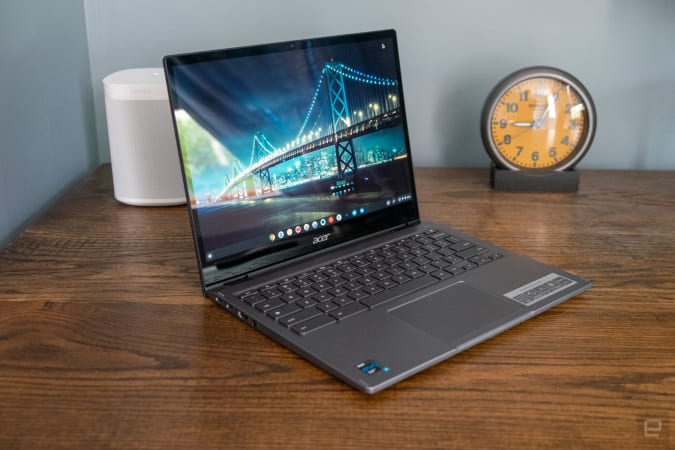
Nathan Ingraham / Engadget
Google has also added support for Android apps on Chromebooks, which greatly expands the amount of software available. The quality varies widely, but it means you can do more with a Chromebook beyond just web-based apps. For example, you can install the Netflix app and save videos for offline watching; other Android apps like Microsoft’s Office suite and Adobe Lightroom are surprisingly capable. Between Android apps and a general improvement in web apps, Chromebooks are more than just a browser.
What do Chromebooks do well, and when should you avoid them?
Put simply, anything web based. Browsing, streaming music and video and using various social media sites are among the most common things people do on Chromebooks. As you might expect, they also work well with Google services like Photos, Docs, Gmail, Drive, Keep and so on. Yes, any computer that can run Chrome can do that too, but the lightweight nature of Chrome OS makes it a responsive and stable platform.
As I mentioned before, Chrome OS can run Android apps, so if you’re an Android user you’ll find some nice ties between the platforms. You can get most of the same apps that are on your phone on a Chromebook and keep info in sync between them. You can also use some Android phones as a security key for your Chromebook or instantly tether your laptop to use mobile data.
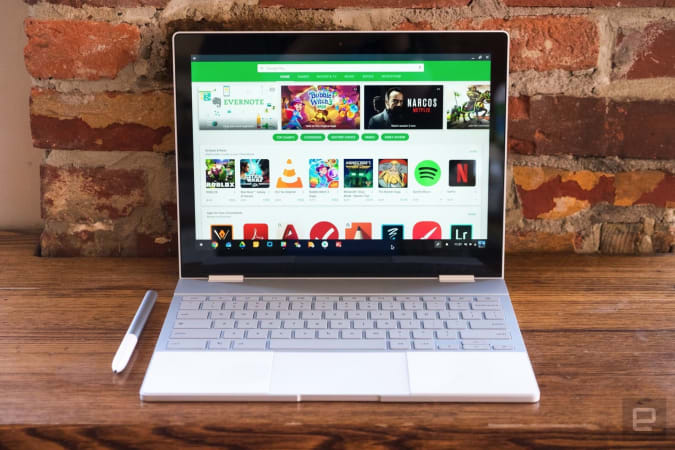
Google continues to tout security as a major differentiator for Chromebooks, and I think it’s definitely a factor worth considering. The first line of defense is auto-updates. Chrome OS updates download quickly in the background and a fast reboot is all it takes to install the latest version. Google says that each webpage and app on a Chromebook runs in its own sandbox, as well, so any security threats are contained to that individual app. Finally, Chrome OS has a self-check called Verified Boot that runs every time a device starts up. Beyond all this, the simple fact that you generally can’t install traditional apps on a Chromebook means there are a lot fewer ways for bad actors to access the system.
As for when to avoid them, the answer is simple: If you rely heavily on a specific native application for Windows or a Mac, chances are good you won’t find the exact same option on a Chromebook. That’s most true in fields like photo and video editing, but it can also be the case in fields like law or finance. Plenty of businesses run on Google’s G suite software, but more still have specific requirements that a Chromebook might not match. If you’re an iPhone user, you’ll also miss out on the way the iPhone easily integrates with an iPad or Mac, as well. For me, the big downside is not being able to access iMessage on a Chromebook.
Finally, gaming is almost entirely a non-starter, as there are no native Chrome OS games of note. You can install Android games from the Google Play Store, but that’s not what most people are thinking of when they want to game on a laptop. That said, Google’s game-streaming service Stadia has changed that long-standing problem. The service isn’t perfect, but it remains the only way to play recent, high-profile games on a Chromebook. It’s not as good as running local games on a Windows computer, but the lag issues that can crop up reflect mostly on Stadia itself and not Chrome OS.
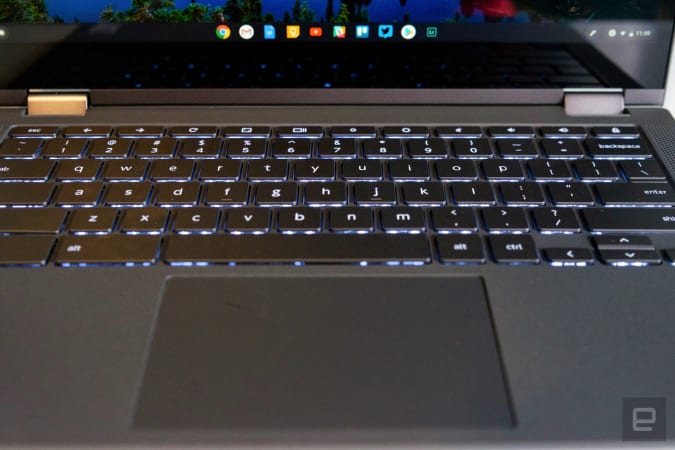
What are the most important specs for a Chromebook?
Chrome OS is lightweight and usually runs well on fairly modest hardware, so the most important thing to look for might not be processor power or storage space. That said, I’d still recommend you get a Chromebook with a relatively recent Intel processor, ideally an eighth-generation or newer M3 or i3. Most non-Intel Chromebooks I’ve tried haven’t had terribly good performance, though Lenovo’s Chromebook Duet 2-in-1 runs surprisingly well on its MediaTek processor.
As for RAM, 4GB is enough for most people, though 8GB is a better target if you have the cash, want to future-proof your investment or if you’re a serious tab junkie. Storage space is another place where you don’t need to spend too much; 64GB should be fine for almost anyone. If you plan on storing a lot of local files or loading up your Chromebook with Linux or Android apps, get 128GB. But for what it’s worth, I’ve never felt like I might run out of local storage when using Chrome OS.
Things like the keyboard and display quality are arguably more important than sheer specs. The good news is that you can find less expensive Chromebooks that still have pretty good screens and keyboards that you won’t mind typing on all day. Many cheap Chromebooks still come with tiny, low-resolution displays, but at this point there’s no reason to settle for anything less than 1080p. (If you’re looking for an extremely portable, 11-inch Chromebook, though, you’ll probably have to settle for less.) Obviously, keyboard quality is a bit more subjective, but you shouldn’t settle for a mushy piece of garbage.
Google has an Auto Update policy for Chromebooks, and while that’s not a spec, per se, it’s worth checking before you buy. Basically, Chromebooks get regular software updates automatically for about six years from their release date (though that can vary from device to device). This support page lists the Auto Update expiration date for virtually every Chromebook ever, but a good rule of thumb is to buy the newest machine you can to maximize your support.
How much should I spend?
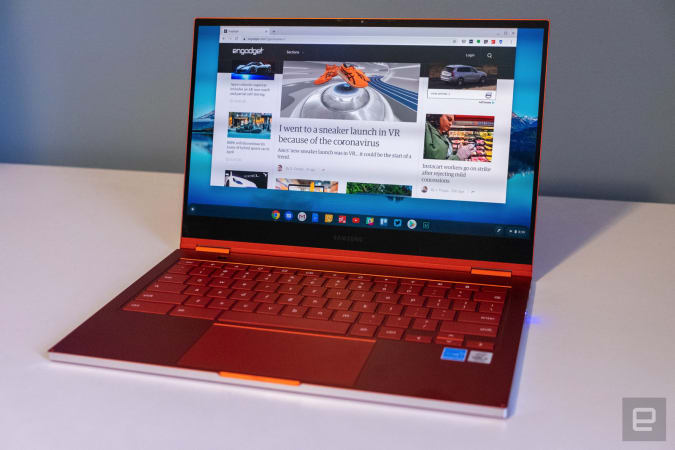
Chromebooks started out notoriously cheap, with list prices often coming in under $300. But as they’ve gone more mainstream, they’ve transitioned from being essentially modern netbooks to the kind of laptop you’ll want to use all day. As such, prices have increased a bit over the last few years. At this point, you should expect to spend at least $400 if you want a solid daily driver. There are still many budget options out there that may be suitable as couch machines or secondary devices, but if you want a Chromebook that can be your all-day-every-day laptop, $400 is the least you can expect to spend.
There are also plenty of premium Chromebooks that approach or even exceed $1,000, but I don’t recommend spending that much. Generally, that’ll get you better design quality with more premium materials, as well as more powerful internals and extra storage space. Of course, you also sometimes pay for the brand name. But, the specs I outlined earlier are usually enough.
Right now, there actually aren’t too many Chromebooks that even cost that much. Google’s Pixelbook Go comes in $999 and $1,399 configurations, but the more affordable $650 and $850 options will be just as good for nearly everyone. Samsung released the $1,000 Galaxy Chromebook in 2020; this luxury device does almost everything right but has terrible battery life. Samsung quickly learned from that mistake and is now offering the Galaxy Chromebook 2 with more modest specs, but vastly better battery life at a much more affordable price (more on that laptop later). For the most part, you don’t need to spend more than $850 to get a premium Chromebook that’ll last you years.
Engadget picks
Best overall: Lenovo Flex 5 Chromebook
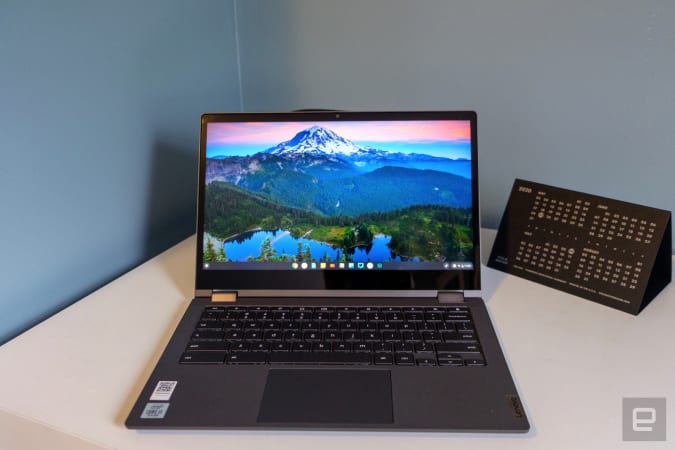
Look beyond the awkward name and you’ll find a Chromebook that does just about everything right that’s also a tremendous value. It gets all the basics right: The 13-inch 1080p touchscreen is bright, though it’s a little hard to see because of reflections in direct sunlight. It runs on a 10th-generation Intel Core i3 processor, the eight-hour battery life is solid, and the backlit keyboard is one of the best I’ve used on any laptop lately, Chromebook or otherwise. The Flex 5 is now a little over a year old, but it still holds up well and is even cheaper than it was when it first launched. It can now regularly be found for well under $400 on Amazon. (As of this writing, it’s priced at $329.) That’s an outstanding value for a Chromebook this capable.
Naturally, Lenovo cut a few corners to hit that price. Most significantly, it only has 4GB of RAM and 64GB of storage. Normally, I wouldn’t recommend anyone buy a computer with those specs — but Chrome OS is far less dependent on local storage. Unless you were planning to store a ton of movies or install a huge variety of Android apps, 64GB is enough for moderately advanced use. I was concerned about the non-upgradeable 4GB of RAM, but my testing showed that the IdeaPad Flex 5 can run plenty of tabs and other apps without many hiccups. If you push things hard, you’ll occasionally have to wait for tabs to refresh if you haven’t viewed them recently, but other than that this is a solid performer, particularly for the price.
Other things in the IdeaPad Flex 5’s favor include that it has both USB-C and USB-A ports and a 360-degree convertible hinge. I personally don’t find myself flipping laptops around to tablet or stand mode very often, but it’s there if you like working in those formats. At three pounds and 0.66 inches thick, it’s not the lightest or slimmest option out there, but those specs are also totally reasonable considering the price.
Ultimately, the Ideapad Flex 5 hits the sweet spot for a large majority of potential Chromebook buyers out there, providing a level of quality and performance that’s pretty rare to find at this price point. That said, given this laptop has been out for over a year now, we’re keeping an eye out for any potential replacements Lenovo offers, as well as comparable options other manufacturers release.
Buy Lenovo Flex 5 Chromebook on Amazon – $430
Upgrade picks: Samsung Galaxy Chromebook 2, Acer Chromebook Spin 713
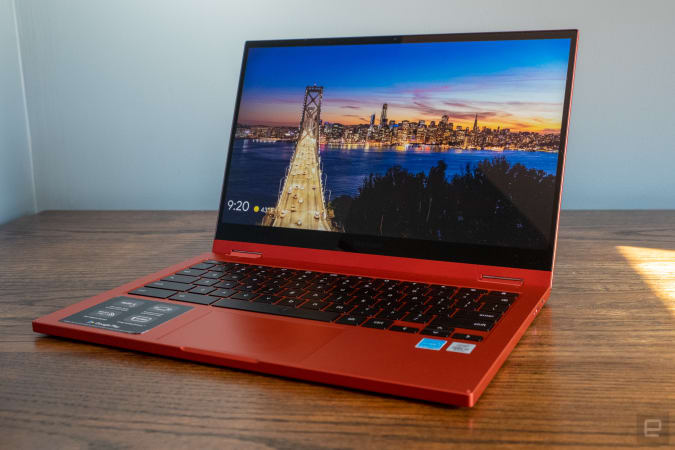
Engadget
Premium Chromebooks with more power, better design and higher prices have become common in recent years. If you want to step up over the excellent but basic Lenovo Flex 5, there are two recent options worth considering: Samsung’s Galaxy Chromebook 2 and Acer’s Chromebook Spin 713.
The Galaxy Chromebook 2 is infinitely more stylish than most other Chromebooks, with a bright metallic red finish and a design that looks far better than the utilitarian Flex 5 and Chromebook Spin 713. As I mentioned earlier, Samsung’s Galaxy Chromebook 2 fixes some of the serious flaws we identified in the original. Specifically, the 2020 Galaxy Chromebook had terrible battery life and cost $999; this year’s model starts at $549 and can actually last seven hours off the charger. That’s not great, but it’s far better than the lousy four hours the original offered.
Samsung cut a few corners to lower the Galaxy Chromebook 2’s price. Most noticeable is the 1080p 13.3-inch touchscreen, down from the 4K panel on the older model. The good news is that the display is among the best 1080p laptop screens I’ve seen in a long time, and the lower resolution helps the battery life, too. The Galaxy Chromebook 2 is also a bit thicker and heavier than its predecessor, but it’s still reasonably compact.
Finally, the Galaxy Chromebook 2 has a 10th-generation Intel Core i3 processor rather than the Core i5 Samsung included last year. All these changes add up to a laptop that isn’t as ambitious, but is ultimately much easier to recommend. Instead of pushing to have the best screen in the thinnest and lightest body with a faster processor, Samsung pulled everything back a bit to make a better-priced but still premium laptop.
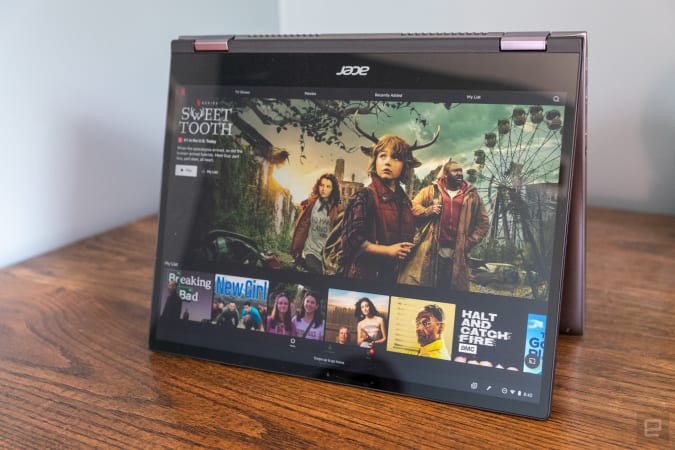
Nathan Ingraham / Engadget
Acer’s Chromebook Spin 713, by comparison, doesn’t look like much from the outside — it’s a chunky gray slab with little to distinguish it from many other basic laptops. While it doesn’t seem exciting, the Spin 713 is just as well-made as the Galaxy Chromebook 2, with a sturdy hinge and body. But what’s most interesting is the display, a 13.5-inch touchscreen with a 3:2 aspect ratio. That makes it a much better option than 1080p displays when you’re scrolling vertically through documents and webpages. It has a somewhat unusual resolution of 2,256 x 1,504, thanks to the taller aspect ratio, but it makes for a more pixel-dense display than you’ll find on your standard 13.3-inch, 1080p laptop. Long story short: The screen is great.
As for the rest of the hardware, the 11th-generation Intel Core i5 processor is more than enough power for most tasks, and the keyboard and trackpad are solid, if not the best I’ve used before. The same can be said for battery life: I got about the same six to seven hours using the Spin 713 as I did using the Galaxy Chromebook 2. I wish it were better in both cases, but it’s in line with other premium Chromebooks I’ve used lately.
The Spin 713 configuration that I tested costs $699, the same as the Galaxy Chromebook 2. Because I’m such a fan of the 3:2 display, I prefer the Spin 713 (which also has a more powerful processor), but the Galaxy Chromebook 2 is worth a look if you want a laptop that has a little more style and a better keyboard.
Last year, Google’s Pixelbook Go was our pick for the best premium model. It’s still an excellent choice and one of my favorite Chromebooks to use, but it’s almost two years old. Its age coupled with its aging 8th-generation Intel processor make it tougher to recommend. That said, it’s still one of the thinnest and lightest Chromebooks around, and it still handles everything I can throw at it. It also has the best keyboard I’ve used on any recent Chromebook. There’s still a lot to like, but it’s harder to justify spending $650 or more on it. Hopefully Google will release an updated version this fall.
Buy Samsung Galaxy Chromebook 2 starting at $549 Buy Acer Chromebook Spin 713 at Best Buy – $629
A good option for kids: Acer Chromebook 512
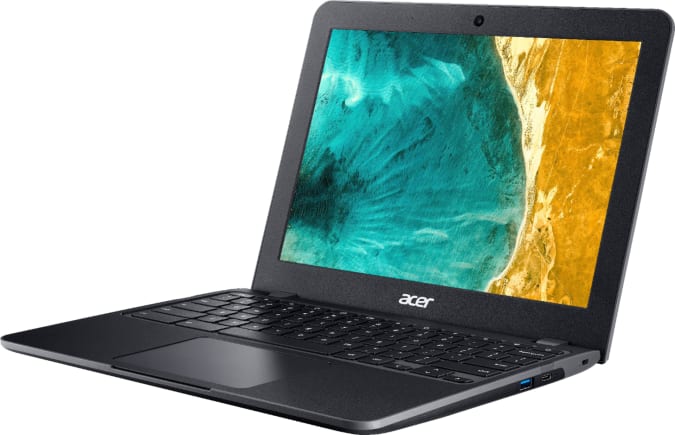
Acer
While Lenovo’s Flex 5 is inexpensive enough that you could get one for your kid, Acer’s Chromebook 512 might be a better option for young ones in your life. First off, it’s specifically built to take abuse. In addition to the military-rated (MIL-STD 810G) impact-resistant body, you can spill up to 330mL of liquid on the keyboard. A drainage system will flush it out and keep the insides working. (Note that I haven’t actually tried that.) The keyboard features “mechanically anchored” keys that should be harder for kids to pick off, too. Regardless of exactly how much water you can pour onto that keyboard, the Chromebook 512 should handle a child’s abuse better than your average laptop.
This computer isn’t a speed demon, but the Intel Celeron N4000 chip coupled with 4GB of RAM and 32GB of storage should be fine for basic tasks. The 12-inch screen isn’t a standout either, but it has the same taller 3:2 aspect ratio as Acer’s Chromebook Spin 713. That means you’ll get more vertical screen real estate than you would on the 16:9, 11-inch panels typically found in laptops of this class. (The Chromebook 512’s screen resolution is 1,366 x 912, whereas most 11-inch Chromebooks use a 1,366 x 768 panel.)
All in all, it’s a fairly modest computer, but grade-school kids, a computer that can take some abuse and runs an easy-to-use OS that’s well supported in education should fit the bill well. The Chromebook 512 is priced at $249.99 direct from Acer, but it’s going for $219.99 as of this writing at other retailers.
[ad_2]
Source link






